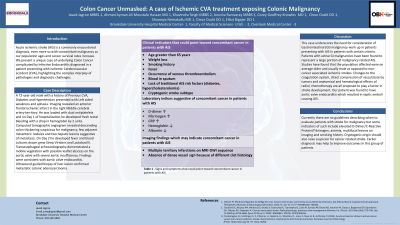Sunday Poster Session
Category: Colon
P0371 - Colon Cancer Unmasked: A Case of Ischemic CVA Treatment Exposing Colonic Malignancy
Sunday, October 27, 2024
3:30 PM - 7:00 PM ET
Location: Exhibit Hall E

Has Audio

Javed Jagroo, MBBS
One Brooklyn Health-Brookdale University Hospital Medical Center
Ozone Park, NY
Presenting Author(s)
Javed Jagroo, MBBS1, Ahmed Ayman Ali Moustafa Hassan, MD2, Khavindra Singh, MBBS3, Anusha Ramasray, MBBS4, Corey Geoffrey Knowles, MD2, Omar Oudit, DO2, Sharanya Nemakallu, MD2, Elliot Bigajer, DO2
1One Brooklyn Health-Brookdale University Hospital Medical Center, Astoria, NY; 2One Brooklyn Health-Brookdale University Hospital Medical Center, Brooklyn, NY; 3University of the West Indies, San Juan, San Juan-Laventille, Trinidad and Tobago; 4Overlook Medical Center, Summit, NJ
Introduction: Acute ischemic stroke (AIS) is a commonly encountered diagnosis, even more so with concomitant malignancy as our population ages and cancer survival rates increase. We present a unique case of underlying Colon Cancer complicated by Infective Endocarditis diagnosed in a patient presenting with ischemic Cerebrovascular accident (CVA), highlighting the complex interplay of pathologies and diagnostic challenges.
Case Description/Methods: A 72-year-old male with a history of Previous CVA, Diabetes and Hypertension presented with Left sided weakness and aphasia. Imaging revealed an anterior frontal ischemic infarct in the right Middle cerebral artery territory. He was loaded with dual antiplatelets and on Day 1 of hospitalization he developed fresh rectal bleeding with a drop in hemoglobin by 2 units. Computed tomographic angiogram revealed descending colon thickening suspicious for malignancy, few adjacent mesenteric nodules and two hepatic lesions suggestive of metastasis. On Day 2 he developed fever and blood cultures drawn grew Strep Viridans and Lactobacilli. Transesophageal echocardiography demonstrated a mobile vegetation with possible leaflet abscess on the aortic valve with severe aortic insufficiency. Findings were consistent with aortic valve endocarditis. Ultrasound guided biopsy of liver lesion confirmed metastatic colonic adenocarcinoma.
Discussion: This case underscores the need for consideration of Gastrointestinal (GI) malignancy work up in patients presenting with AIS in patients with certain criteria. Patients with active GI malignancies have been found to represent a large portion of malignancy related AIS. Studies have found that the population affected were on average older and usually male as opposed to non-cancer associated ischemic strokes. Changes to the coagulation system, direct compression of vasculature by tumors and anatomical and hematological effects of radio/ chemotherapy are all proposed to play a factor in stroke development. Our patient was found to have aortic valve endocarditis which resulted in septic emboli causing AIS. Currently there are no guidelines describing when to evaluate patients with stroke for malignancy but some indicators of such include elevated D-Dimer/C-Reactive Protein/Fibrinogen, anemia, multifocal lesions on imaging and smoking history. Cryptogenic origin should also raise suspicion for cancer related stroke. Earlier diagnosis may help to improve outcomes in this group of patients.
Disclosures:
Javed Jagroo, MBBS1, Ahmed Ayman Ali Moustafa Hassan, MD2, Khavindra Singh, MBBS3, Anusha Ramasray, MBBS4, Corey Geoffrey Knowles, MD2, Omar Oudit, DO2, Sharanya Nemakallu, MD2, Elliot Bigajer, DO2. P0371 - Colon Cancer Unmasked: A Case of Ischemic CVA Treatment Exposing Colonic Malignancy, ACG 2024 Annual Scientific Meeting Abstracts. Philadelphia, PA: American College of Gastroenterology.
1One Brooklyn Health-Brookdale University Hospital Medical Center, Astoria, NY; 2One Brooklyn Health-Brookdale University Hospital Medical Center, Brooklyn, NY; 3University of the West Indies, San Juan, San Juan-Laventille, Trinidad and Tobago; 4Overlook Medical Center, Summit, NJ
Introduction: Acute ischemic stroke (AIS) is a commonly encountered diagnosis, even more so with concomitant malignancy as our population ages and cancer survival rates increase. We present a unique case of underlying Colon Cancer complicated by Infective Endocarditis diagnosed in a patient presenting with ischemic Cerebrovascular accident (CVA), highlighting the complex interplay of pathologies and diagnostic challenges.
Case Description/Methods: A 72-year-old male with a history of Previous CVA, Diabetes and Hypertension presented with Left sided weakness and aphasia. Imaging revealed an anterior frontal ischemic infarct in the right Middle cerebral artery territory. He was loaded with dual antiplatelets and on Day 1 of hospitalization he developed fresh rectal bleeding with a drop in hemoglobin by 2 units. Computed tomographic angiogram revealed descending colon thickening suspicious for malignancy, few adjacent mesenteric nodules and two hepatic lesions suggestive of metastasis. On Day 2 he developed fever and blood cultures drawn grew Strep Viridans and Lactobacilli. Transesophageal echocardiography demonstrated a mobile vegetation with possible leaflet abscess on the aortic valve with severe aortic insufficiency. Findings were consistent with aortic valve endocarditis. Ultrasound guided biopsy of liver lesion confirmed metastatic colonic adenocarcinoma.
Discussion: This case underscores the need for consideration of Gastrointestinal (GI) malignancy work up in patients presenting with AIS in patients with certain criteria. Patients with active GI malignancies have been found to represent a large portion of malignancy related AIS. Studies have found that the population affected were on average older and usually male as opposed to non-cancer associated ischemic strokes. Changes to the coagulation system, direct compression of vasculature by tumors and anatomical and hematological effects of radio/ chemotherapy are all proposed to play a factor in stroke development. Our patient was found to have aortic valve endocarditis which resulted in septic emboli causing AIS. Currently there are no guidelines describing when to evaluate patients with stroke for malignancy but some indicators of such include elevated D-Dimer/C-Reactive Protein/Fibrinogen, anemia, multifocal lesions on imaging and smoking history. Cryptogenic origin should also raise suspicion for cancer related stroke. Earlier diagnosis may help to improve outcomes in this group of patients.
Disclosures:
Javed Jagroo indicated no relevant financial relationships.
Ahmed Ayman Ali Moustafa Hassan indicated no relevant financial relationships.
Khavindra Singh indicated no relevant financial relationships.
Anusha Ramasray indicated no relevant financial relationships.
Corey Geoffrey Knowles indicated no relevant financial relationships.
Omar Oudit indicated no relevant financial relationships.
Sharanya Nemakallu indicated no relevant financial relationships.
Elliot Bigajer indicated no relevant financial relationships.
Javed Jagroo, MBBS1, Ahmed Ayman Ali Moustafa Hassan, MD2, Khavindra Singh, MBBS3, Anusha Ramasray, MBBS4, Corey Geoffrey Knowles, MD2, Omar Oudit, DO2, Sharanya Nemakallu, MD2, Elliot Bigajer, DO2. P0371 - Colon Cancer Unmasked: A Case of Ischemic CVA Treatment Exposing Colonic Malignancy, ACG 2024 Annual Scientific Meeting Abstracts. Philadelphia, PA: American College of Gastroenterology.
